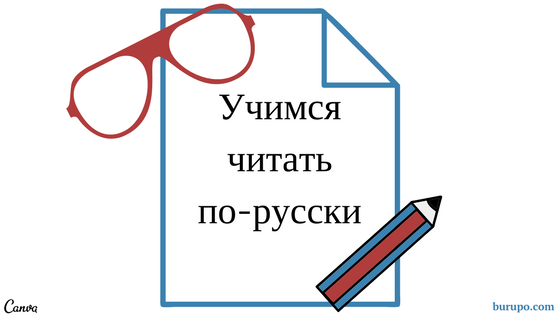We write and speak a bit differently in Russian. And to know the alphabet is necessary but not sufficient to read Russian right. There are also the reading rules. Fortunately, there are not that many as there are in English. You even don’t need to use transcriptions! Just learn these several rules, and you will be able to read almost any Russian word. So what are the rules?

First, let’s check if you already know the alphabet well. Can you read these words? Check yourself with the audio.
Анана́с, ва́за, бана́н, гита́ра, раке́та, луна́, ма́ма, па́па, приве́т, му́зыка, матрёшка, ша́пка, ла́мпа, кино́, ко́фе, чай, лимо́н, стул, суббо́та, до́ллар, ру́бль, Ита́лия, Аме́рика, Испа́ния.
If you don’t remember all the letters well, you’d better first to revise the alphabet and then come back here to the reading rules.
Voiced and unvoiced consonants
There are six pairs of voiced and unvoiced consonants in Russian. We distinguish them by using or not using the voice. To make a consonant voiced ‘turn on’ the voice (imagine you are singing), and to make it unvoiced ‘turn off’ the voice (imagine you are whispering).
Compare:
[б] — [п], [в] — [ф], [г] — [к], [д] — [т], [ж] — [ш], [з] — [с]
But in some positions, we read the letters б, в, г, д, ж, and з as unvoiced, and the letters п, ф, к, т, ш and с as voiced consonants. Let’s have a look, what are the rules here.
Unvoicing
1. Consonant at the word end is always unvoiced
паб[п], клуб[п], хлеб[п], Ки́ев[ф], о́бувь[ф’], утю́г[к], друг[к], вдруг[к], год[т], рад[т], наза́д[т], гара́ж[ш], нож[ш], глаз[с], раз[с]
2. Voiced consonant before the unvoiced sounds unvoiced
ю́бка[пк], авто́бус[фт], вто́рник[фт], встре́ча[фс], вы́ставка[фк], Вашингто́н[кт], идти́[т:], по́дпись[тп], ло́жка[шк], тёзка[ск], у́зкий[ск]
Voicing
1. Unvoiced consonant before the voiced sounds voiced
анекдо́т[гд], рюкза́к[гз], футбо́л[дб], сда́ча[зд], с дру́гом[зд]
2. But not before B
квас[кв], кварти́ра[кв], отве́т[тв], твой[тв], Шве́ция[шв], свет[св], свой[св]
Reduction of vowels
А and О
1. Unstressed А sounds less clear and intensive
бана́н, тала́нт, стака́н, ма́ма, па́па, кра́ска, па́пка, анана́с, бараба́н, каранда́ш, капита́н, калькуля́тор
2. Unstressed О sounds like unstressed А
окно́[акно́], молоко́[малако́], Москва́[Масква́], молоде́ц[малад′е́ц], пого́да[паго́да], у́тро[у́тра], ско́лько[ско́л′ка], отли́чно[атл′и́ч′на], хо́лодно[хо́ладна], до́рого[до́рага]
Е and Я
If you read the post on the alphabet, you already know that е and я consist of two sounds ([йэ], [йа]), and the [й]-component makes the previous consonant sound soft: де [д′э], дя [д′а]. This way е and я sounds in a stressed position. When unstressed, we reduce them to [йи] or [′и].
1. The letter ‘Я’ in a stressed and unstressed positions
мя́ч[м′а] – мячи́[м′и], мя́со[м′а] – мясно́й[м′и], пря́мо[р′а] – прямо́й[р′и], горя́чий[р′а] – горячо́[р′и]; я́хта[йа] – язы́к[йи], я́блоко[йа] – яйцо́[йи], я́рко[йа] – янва́рь[йи], я́года[йа] – япо́нский[йи] язы́к[йи]; ноя́брь[йа] – за́яц[йи], стоя́ть[йа] – ма́ятник[йи], прия́тно[йа] – де́ятель[йи], смея́ться[йа] – двуязы́чный[йи]
2. The letter ‘Е’ in a stressed and unstressed positions
ле́с[л′э] – леса́[л′и], ле́то[л′э] – лета́ть[л′и], ве́к[в′э] – весна́[в′и], бе́гать[б′э] – бежа́ть[б′и]; е́вро[йэ] – Евро́па[йи], е́сли[йэ] – Еле́на[йи], е́ду[йэ] – еда́[йи], е́хать[йэ] – Его́р[йи]; дие́та[йэ] – Ки́ев[йи], твое́й[йэ] – моему́[йи]
3. Я and Е at the word end
If я or е is the last letter in the word, in a unstressed position it just sounds less intensive but doesn’t turn to [йи].
ба́ня, Ва́ня, дя́дя, пе́сня, люба́я, си́няя, пе́нсия, дво́е, тро́е, мо́ре, по́ле, го́ре, чёрное, бе́лое
4. А after Ч or Щ
The sounds [ч′] and [щ′] are always soft in Russian, so going together with а they are similar to any other consonant going together with я. Compare: ча [ч′а] and дя [д′а]. That is why in these syllables, we read unstressed а as [и].
час[ч′а] – часы́[ч′и], чай[ч′а] – слу́чай[ч′и], обеща́ть[щ′а] – пло́щадь[щ′и]
But at the word end, unstressed ча and ща save the [а]-sound, though less clear and intensive one.
зада́ча[ч′а], встре́ча[ч′а], да́ча[ч′а], сда́ча[ч′а], тёща[щ′а], ро́ща[щ′а]
5. Е after Ш, Ж, Ц
The sounds [ш], [ж] and [ц] are always hard, so a unstressed е after ш, ж, or ц sounds [ы] instead of [и].
цена́[цы], жена́[жы], шесто́й[шы]
6. Э at the beginning of a word
In a stressed position, э sounds [э]: э́тот, э́та, э́ти
At the beginning of a word, you can read unstressed э as [ы] or [и]. Do the way you like more.
экза́мен, эта́ж, эконо́мика, экономи́ст, экономи́ческий факультет, экску́рсия, экскурсово́д
More rules
1. ЧТ and ЧН sometimes sound ШТ and ШН
[ш]что́, [ш]что́-то, [ш]что́-нибудь, [ш]что́бы
If there is no «что» in a word, then ч sounds [ч].
по́чта, почти́, мечта́, то́чно, да́чник, кори́чневый
And these words you need to remember:
коне́чно[шн], ску́чно[шн], наро́чно[шн]
2. СЧ sounds Щ
счёт[щ], насчёт[щ], сча́стье[щ], счита́ть[щ]
3. ТЬСЯ and ТСЯ often sounds [ца]
встре́титься[ца], учи́ться[ца], он у́чится[ца], она́ занима́ется[ца], они́ интересу́ются[ца]
But not always: встре́ться[т′с′а]
4. СШ sounds long [ш:]
сшить, вы́сший, масшта́б
ЗЖ sounds long [ж:]
по́зже, попо́зже, езжа́й
ТЦ, ДЦ sounds long [ц:]
отцы́, вкра́тце, молодцы́, два́дцать
5. In some combinations, we don’t pronounce all of the consonants
с(т)н: гру́стно[сн], изве́стно[сн], че́стный[сн], уча́стник[сн]
з(д)н: пра́здник[зн], по́здно[зн], звёздный[зн]
р(д)ц: се́рдце[рц]
(л)нц: со́лнце[нц]
(в)ств: здра́вствуйте[ств], чу́вство[ств]
6. Г between two О’s (or between Е and О) often sounds В
сего́дня[иво], кого́[аво], его́[йиво], того́[аво], э́того[ава], ничего́[иво], всего́[иво], хоро́шего[ива], си́него[ива], пе́рвого[ава], второ́го[ова], тре́тьего[йива], моего́[йиво], твоего́[йиво], ва́шего[ива], на́шего[ива]
But not always: мно́го[ога], до́рого[ага], пого́да[аго], догово́р[ага], стро́го[ога]
Which of these rules you already know, and which of them are new to you?
Preparing this article, I used the following books and resources:
- Брызгунова, Елена Андреевна. Практическая фонетика и интонация русского языка : Пособие для преподавателей, занимающихся с иностранцами. – Москва : Изд-во Московского ун-та, 1963. – 306 с.
- Portal “Gramota.ru”

